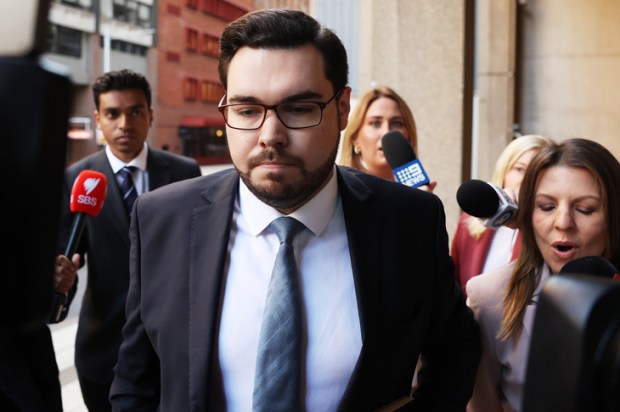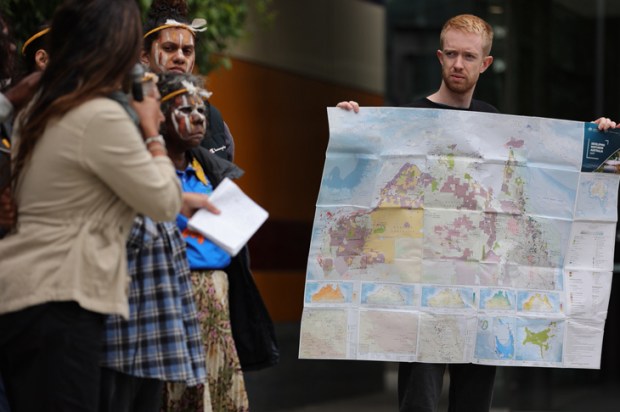‘University politics are vicious precisely because the stakes are so small,’ quipped Henry Kissinger adding, ‘University politics make me long for the simplicity of the Middle East.’
Today, we get the heady mixture of university politics and the violence of the Middle East justified by students, academics and administrators at Australia’s supposedly most prestigious universities – in Sydney, Melbourne, and Canberra. No one should be surprised.
As chants calling for a global intifada rang out under the sandstone spires of Sydney University, the office of the Deputy Vice-Chancellor for Student Affairs was sanguine. A memo issued by the office said that, ‘The University acknowledges the use of the word ‘intifada’ is viewed by some as having an inherent link to violence or terrorist acts, and at times violence or terrorism has been a feature of events that were characterised as intifadas occurring across the Middle East.’
Indeed. And who might those people be? The Cambridge Dictionary, for example, defines ‘intifada’ as a ‘violent act of opposition by the Palestinian people’.
That’s not good enough for the pen pushers in the office of the Deputy Vice-Chancellor for Student Affairs. The memo continues: ‘the University does not accept that every use of the word can reasonably be interpreted in this way, and in the context of current pro-Palestine protests, use of the word is more appropriately viewed as an expression of a political stance in connection with pro-Palestinian activism as opposed to being a statement in support of terrorist acts.’
It’s hard to imagine how the use of the word ‘intifada’ could mean anything other than a violent uprising.
In the first intifada (1987-1993), more than 3,600 Molotov cocktails were lobbed at Israelis – both soldiers and civilians – as well as 100 hand grenades and 600 assaults with guns or explosives, according to the Jewish Virtual Encyclopaedia.
The victims included more than a thousand Palestinians who were accused by the Palestine Liberation Organisation (PLO) of ‘collaborating’ with Israel. The brutality of the death squads that executed the ‘collaborators’ was horrific; those who were shot to death could perhaps be considered lucky compared with victims who were stabbed, clubbed, hacked to death with axes, or burned with acid. A footnote perhaps for those concerned about violence against women – among those executed by the PLO were women accused of ‘immoral behaviour’.
In the second intifada (2000-2005) assailants used Molotov cocktails, pistols, assault rifles, machine guns, hand grenades and explosives with more than a thousand Israelis murdered in suicide bombings, sniper attacks and ambushes, and almost five thousand Palestinians dying often because those launching the attacks did so in crowds putting Palestinian civilians in danger.
It is not clear when the third intifada, which started in 2015 and is referred to as the stabbing intifada, ended. It was still going in 2021. It has mostly involved the stabbing, shooting or ramming of Israeli citizens with cars.
Like the first two intifadas, it has been praised by Palestinian leaders with Palestinian President Mahmoud Abbas repeatedly calling the attacks a ‘justified, popular uprising’ and Hamas leader Khaled Meshaal saying in 2015 that, ‘The so-called peace process is futile. There is no peace. Only the path of Jihad, sacrifice, and blood will bear fruit.’
We can call the invasion of Israel on 7 October, 2023 the fourth intifada with the murder of more than 1,200 Israelis, the kidnapping of another 240, and the injury of thousands more. Significantly however, while it did not inspire widespread violence in the West Bank, it immediately launched a worldwide wave of marches in ‘solidarity’ with the Palestinians, with protesters calling for the ‘liberation’ of Palestine from ‘the river to the sea’.
To be clear, these are calls for the destruction of Israel. No one at any rally since 7 October has been heard chanting, ‘What do we want? A two-state solution. When do we want it? Now!’ The ‘liberation’ of Palestine would inevitably lead to the massacre of its inhabitants if they were unable to flee to a safe haven. The ethnic cleansing of Jews in the Middle East and North Africa is nothing new. After the creation of the state of Israel, nearly a million Jews were forced to flee from countries such as Iraq, Syria, and Libya.
Aa well as the protests there have been attacks on Jews and threats of violence – Jewish women stabbed to death in France and the US, a mob in Dagestan who stormed an airport to ‘find Jews’ on a flight from Tel Aviv, protesters who gathered outside the Sydney Opera House chanting ‘Gas the Jews!’ and ‘Where’s the Jews?’, and a teenager in Sydney who was arrested this week after he texted that he wanted to attack Jews.
This is the globalisation of the intifada, the terrorising of the Jewish diaspora, for which protesters, including those on the campus of Sydney University, are calling. It has a long, ugly history. Calls to globalise the intifada have been recorded on campuses in Canada as far back as 2002 and in the US since 2004. In October 2023, a pro-Palestinian mob in New York chanted ‘Globalise the Intifada!’ while attempting to force their way into a library where Jewish students had taken refuge.
Last week, Greens Senator David Shoebridge showed his support for the protesting students at Sydney University ‘occupying’ the ‘quad lawns in solidarity with Gaza’ by sharing a video of them on social media with music in which the lyrics say, ‘It’s about time that we globalise the Intifada’ while Macquarie University academic Dr Randa Abdel-Fattah participated in the protest alongside children as young as five who chanted ‘intifada’ and ‘Israel is a terrorist state’.
It is no coincidence that those universities at which students have endorsed Palestinian violence are also those that ostentatiously refused the generous offer to establish fully funded degrees in Western Civilisation endowed by the late philanthropist Paul Ramsay.
The University of Sydney, which turned down the Ramsay Centre, had no problem, however, in accepting money from the Qatar Foundation which maintains close ties to the Muslim Brotherhood, of which Hamas is an offshoot, and is linked directly to its infamous leader, Yusuf al-Qaradawi.
The Qatar Foundation has been channeling billions of dollars to prestigious universities in the US and Europe, and some has also found its way to the University of Sydney.
‘The first duty of a university is to teach wisdom, not trade; character, not technicalities,’ wrote Winston Churchill in a self-portrait in 1954. If Churchill were alive today he would probably not be allowed to speak at the West’s most prestigious universities where the getting of wisdom increasingly seems to occur in spite of the efforts of staff.
Got something to add? Join the discussion and comment below.
You might disagree with half of it, but you’ll enjoy reading all of it. Try your first month for free, then just $2 a week for the remainder of your first year.













